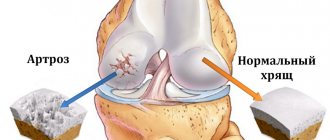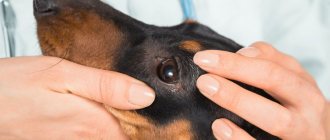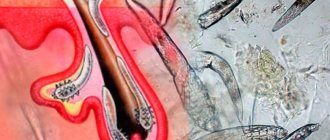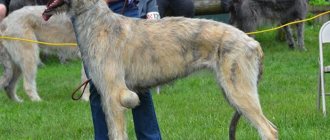General information about deworming
Deworming is an integral part of health and preventive procedures aimed at destroying worms and their eggs in domestic animals. If worms are found in your puppy, you need to know what to do. After all, parasites can cause many health problems.
Anthelmintic for dogs before vaccination: rules and recommendations
Measures to destroy helminths help prevent:
Advertising:
- the occurrence of diseases caused by parasites;
- the appearance of helminthiases in offspring;
- infection of people and other pets.
The main principle is the smallest portion of the product with the greatest benefit.
How often should I give my dog anthelmintic?
This question worries many owners. Anthelmintic drugs designed for puppies of different ages can be used as prevention and treatment. Most veterinarians are of the opinion that it is optimal to worm animals up to four times a year. It is not necessary to strictly link these events to calendar dates; it is enough to simply observe the frequency.
Anthelmintic drugs designed for puppies of different ages
How often is it allowed to deworm adult pets and puppies? In order not to harm your pet, you need to remember some nuances:
- Preventive deworming is carried out systematically, starting from two weeks of age. Further treatment is prescribed taking into account the vaccination schedule. 10-14 days before vaccination, the body is treated against helminths;
- therapeutic worming is performed as prescribed by a veterinarian, but only when tests show the presence of helminths, or when worms are noticed in dog feces;
- poison protozoa before mating to prevent infection of newborns;
- severe infection requires re-treatment 10 days after the first worming.
Anti-worm medications are used monthly for puppies up to six months of age.
Therapeutic worming is performed as prescribed by a veterinarian, but only when tests show the presence of helminths
How often should a dog be wormed?
Even if your pet lives in sterile conditions and you think that he does not have worms, it is still necessary to regularly worm your puppy and adult dog for preventive purposes.
First deworming
Worms can even appear in newborn puppies. They become infected from their mother, for example through the placenta or milk. Therefore, the first treatment is carried out 3-4 weeks after birth. It is important to use special preparations marked “for puppies”.
The second time worming of puppies should be carried out 10 days after the first dose of the drug. This is necessary in order to remove parasite decay products from the body.
Breaks in domestic dogs
Even if an animal does not leave the apartment, this does not mean that it cannot be infected. Insects - flies and cockroaches - can be carriers of parasite eggs. Also, dirt from the street can be brought into the house on shoes and clothes by the owner himself.
The frequency of preventive deworming depends on the age of the animals. It is recommended to deworm dogs under one year of age once every 3 months. In adult animals, preventive treatment is carried out once every six months.
The number of procedures should also depend on nutrition. If an animal eats natural food (raw meat, minced meat, offal and fresh fish), the risk of infection with parasites increases. Therefore, it is recommended to carry out treatment once every 3-4 months.
For preventive purposes, the animal is treated for worms once. But if parasitosis is suspected, the drug is given again 10-14 days after the first procedure. When deworming, the drug acts only on adult parasites. After 1.5-2 weeks, intact worm eggs mature and grow. They are destroyed with the second dose of the drug.
Signs of parasitosis for which repeated deworming is recommended:
- blood, mucus or adult forms of worms in the stool;
- bloating, characteristic rumbling;
- increased appetite accompanied by weight loss;
- diarrhea and vomiting;
- constipation;
- The dog rubs its anus on the floor, reaching for its tail with its teeth.
Important! If an animal is to be vaccinated, it must be dewormed 7-10 days before vaccination.
Read Treatment of allergies in a French bulldog: selection of dry food
How to give drugs to street pets
Animals that live or spend a lot of time outdoors are much more likely to become infected with worms. A dog can pick up worms, for example, by picking up something from the ground, drinking water from a puddle, or by contact with other animals. In this case, it is recommended to give the drug against worms 3-4 times a year.
Deworming for pregnant and lactating women
Deworming is contraindicated in pregnant and lactating dogs. This can negatively affect the health of the puppies. This is especially worth considering in the first half of pregnancy, when all systems and organs are formed in puppies, and any negative intervention can lead to the development of pathologies. It can also cause a miscarriage.
Attention! It is better to worry about getting rid of parasites in advance and worm the dog 1.5-2 weeks before mating. But during estrus it is not recommended to do this.
It is not always possible for the owner to rid the pet of worms before mating. What to do in this case? On the one hand, deworming during pregnancy is dangerous, and on the other hand, parasites can also negatively affect the development of the fetus.
The best option is to use a product that is not contraindicated for pregnant and lactating animals. It is recommended to worm a pregnant dog in the second half of its term, and it is best to do this under the supervision of a veterinarian. A nursing dog can be dewormed no earlier than 2-3 weeks after the birth of the puppies.
Classification of anthelmintic drugs for dogs
Anthelmintic drugs for dogs are classified according to their composition, principle and spectrum of action. When purchasing a product, you should definitely take these points into account. The classification will help you navigate when choosing medications.
Anthelmintic drugs for dogs are classified according to composition
According to the operating principle
Depending on what happens to helminths under the influence of the substance, they are divided into:
- leading to paralysis of protozoa - “Albendazole”, “Piperazine”, “Pyrantel”;
- blocking the metabolism of worms - “Mebendazole”, “Aminoakrihin”, “Pirvinium”;
- damaging protective covers of helminths - “Fenasal”, “Praziquantel”.
According to the spectrum of action
The spectrum of action is determined by laboratory tests of the biomaterial. This will help you choose the most effective substance. The components are distinguished according to the spectrum:
- those that affect protozoa living inside the intestines (nematodes, cestodes) - “Pyrantel”, “Perviny”, “Carbendatsim”, “Fenasal”, “Praziquantel”;
- affecting extraintestinal parasites (trematodes, extraintestinal nematodes) - “Praziquantel”, “Ditrazine citrate”.
The spectrum of action is determined by laboratory tests of the biomaterial.
According to active substance
The presented list of drugs used to poison various types of worms in puppies and dogs is by no means exhaustive. The most effective active ingredients are given:
- decaris;
- albendazole;
- mebendazole;
- pyrantel;
- piperazine
Treatment of helminthic infestations
Therapy consists of deworming and improving the health of the dog. Anthelmintics are prescribed after the necessary laboratory tests, although helminths can be detected visually when they come out. Knowing what worms look like in dogs, you can determine what type of worms caused the disease and what medications will help eliminate the problem.
Selection of anthelmintic drugs
Antihelmintics are divided according to the principle of action into 2 types:
- preventing worms from feeding;
- paralyzing their neuromuscular system.
If worms are discovered in a dog, treatment should be started immediately. If it is not possible to immediately contact a veterinarian, you can independently give the animal the medications recommended for the prevention of helminthic infestations. Without professional diagnostics, it is better to use universal broad-spectrum agents, among which the following are considered the most effective:
- "Milbemax" - affects larvae and mature helminths of all types;
- "Drontal Plus" - destroys only intestinal worms, but is not effective against larvae.
You can now view the current price of drugs and buy them right here:
Deworming procedure
Anthelmintics are given to the dog repeatedly at short intervals. During this period it is necessary
monitor the animal’s condition in order to speed up cleansing with an enema or laxative if necessary.
The drug is usually given with breakfast, mixed with your pet's favorite treat. If the dog does not want to take the medicine, the tablet is placed deeper on the tongue, the jaws are clenched and the muzzle is raised. For puppies, a tablet pre-crushed and dissolved in water is injected into the mouth with a syringe without a needle.
If the dog’s condition worsens sharply after deworming, you need to give it enterosorbent (activated carbon) and contact a veterinarian. Further treatment measures should be carried out under medical supervision.
What is the best anti-worm treatment for puppies?
Offspring can become infected with helminths while still in the womb, and after birth through mother's milk. It should be noted that the puppy has one type of worms, which causes the disease toxocariasis.
During various hormonal processes, the larvae become active and pass through the placenta to the embryos.
How can you tell if your puppy has worms? All babies are born already infected with Toxocara eggs. In females, there are always larvae of these helminths in the muscles, but they are not active, and it is impossible to determine their presence. During various hormonal processes, the larvae are activated and pass through the placenta to the embryos. In newborns, toxocara are located inside the abdomen, here they pose a particular danger, so they must be destroyed as soon as possible. Therefore, deworming of a litter of puppies for the first time should be carried out on the 14th day from birth.
In the fight against toxocariasis in dogs, medications containing pyrantel are used. Taking into account the development cycle of helminths, the medicine is given to young animals constantly, twice a month. After the 1st year, dogs are treated quarterly against this type of parasite for prevention.
Tablets for dogs against worms, other medicine and preparations
In earlier times, the deworming procedure was more complicated than it is now. The dog was not fed for 24 hours before using the medicine. And for greater effect, they also gave laxatives. Now, to completely defeat worms, a single dose of the product is enough without any auxiliary procedures. And within 24 hours almost all the worms die.
Universal medications are used for regular prevention of helminthiasis. And specialized products are prescribed by a veterinarian based on the results of laboratory tests, which are carried out in case of severe infection.
For puppies, age-specific medications should be used, since some medications should not be given to puppies at all. It is also important to carefully observe the dosage, since exceeding it not only causes toxicosis, but can also lead to the death of the puppy.
Preparations and tablets specifically for worms in puppies:
- Drontal Junior,
- Prazitel,
- Dirofen.
For adult dogs, the following medications are chosen:
- Azinox plus,
- Drontsit,
- Vermox,
- Helminthal,
- Kanikvantel and others.
The success of deworming cannot be judged by the presence or absence of worms in the feces. Therefore, if the instructions for the drug recommend using it repeatedly, you must follow this prescription. It is better not to mix the tablet into food; the dog may refuse to eat if it smells a different smell. The tablet should be placed deep on the root of the dog’s tongue and immediately.
For a puppy, you can crush the tablet and separate the required part of the powder according to the baby’s weight, dissolve it in water and insert it into the mouth with a syringe without a needle.
Forms of preparations for worms in dogs
Modern remedies for worms in dogs not only act quickly, but also have an easy-to-use form. For example, medications for dogs are available in the form of sugar cubes.
When deworming yourself, remember the contraindications. For example, the same drops on the withers are not suitable for pregnant, weakened and newborn animals, as well as for pets with kidney and liver diseases.
Monitor the dosage carefully. Most medications are safe: if you give a little more medication, nothing will happen to your pet. But if the animal receives a dose less than necessary, then the therapy may be ineffective.
In general, when deworming old and weakened pets, softer preparations or herbal medicines are often used. In this case, the worms die gradually, which means that the risk of intestinal blockage when they exit is reduced. Sometimes oil-based laxatives are also used to help such animals.
When it's serious
Weight loss with normal nutrition and allergies, nervous behavior, dullness of the coat, poor appetite, gastrointestinal upset - all this appears with severe infection. In addition, these symptoms may indicate other diseases.
This applies to everyone
Sometimes after treatment you have to do repeated deworming. This is due to the peculiarities of the life cycle of worms. Medicines act only on adult individuals, and do not affect larvae, which may be located in other organs.
Dogs of any age can easily become infected with worms. Almost all worms enter their body through the intestines, except for some types of helminths transmitted through the bite of blood-sucking insects.
Important! Worms are transmitted to humans through dog saliva. To do this, it is not necessary that she lick her hands. Since all dogs lick their fur, it only takes petting it and not washing your hands afterwards for infection to occur.
Effective medications for small puppies
For the treatment and treatment of the smallest pets, special means have been developed so that they can be dewormed with minimal consequences for health. Be sure to pay attention to the age and weight indicated on the packaging.
Effective medications for small puppies
Anti-worming medications depending on the puppy’s age:
- at 1 month - Drontal Junior suspension (1 ml-1 kg of weight);
- at 2 months - Dosalid tablets (10.5 mg-1 kg of weight);
- at 3 months - Milbemax tablets (0.5 tablets - 1 kg of weight);
- at 4 months - Prazicide suspension (1 ml-1 kg of weight).
Features of anthelmintic measures in some dog breeds
Among dog breeds, there are those that are particularly sensitive to a certain active component of anthelmintic medications. In order not to put your pet at risk and to prevent allergic reactions, you should not use medications that contain aggressive components.
Among pets that are highly sensitive, the following breeds stand out:
Among dog breeds, there are those that are particularly sensitive to a certain active component of anthelmintic medications.
- Australian Shepherds;
- bobtails;
- long-haired whippets;
- collie;
- silky windhounds;
- Sheltie
This susceptibility is associated with the presence of mutations in the gene structure that distributes drug components within the dog’s organs and systems.
Externally, individual increased susceptibility manifests itself:
- depressed state;
- paresis;
- trembling in the body;
- allergic manifestations (in particularly difficult cases, anaphylactic shock may develop).
Features of anthelmintic measures in some dog breeds
Before deciding what to give for worms to a mature animal or puppy, it is necessary to take into account that sensitive breeds often do not tolerate the active substance ivermectin. Therefore, carefully re-read the composition.
What to do if taking medications causes the above symptoms in your pet? Whatever the symptoms of poisoning, you should show your dog to a veterinarian.
Which form of release is the most effective?
The form of release of anthelmintic drugs does not affect the result. Only the speed of action can differ. In specialized pet stores you will find different types of medications. It is worth purchasing them based on convenience. You can choose from the following forms:
- tablets;
- paste;
- drops;
- suspensions;
- injection solutions.
The form of release of anthelmintic drugs has no effect on the result
How to give medicine to a dog?
Each medicine is accompanied by detailed instructions on the rules of administration and dosage. There is an indication of the age for which it is intended.
You need to be especially careful when measuring the required amount of medicine, because the composition contains toxic substances. The indicated dosage will not cause negative consequences for dogs, but exceeding it is dangerous, even fatal.
To worm a puppy, it is forbidden to choose products for people. The wrong dosage is fraught with disastrous consequences.
To worm a puppy, it is forbidden to choose products for people
Pills
How to give an anti-worm tablet? You can do this in different ways :
- The tablet is masked with food that your pet particularly likes. It is necessary to ensure that the dog has eaten all the medicine;
- mix the crushed tablet into the food (there should be a little of it);
- when it is undesirable to crush a tablet or capsule, they are used whole. The pet is seated, the head is slightly tilted back, the medicine is placed on the base of the tongue, and the jaws are closed. They keep it this way for a while until the dog swallows the pill.
The dog can spit out suspension medications, so they are used during feeding.
Please note: do not push the medicine down the throat; the animal may suffocate.
Among the drugs that are in demand are the following:
- "Prasicide." Approximately 130 rub. 1 tablet per 10 kg of weight. Give in the morning, mixing with food.
- "Dirofen Plus". From 30 rub. 1 tablet per 5 kg of weight. Give during feeding, mixing with food.
- "Milbemax". From 360 rub. 1 tablet per 5-10 kg of weight, up to 5 kg 0.5 tablets.
Review of anthelmintic drugs
There are many dewormers for dogs. They can be either broad-spectrum for preventive treatment or targeted for getting rid of a specific type of parasite. It is recommended to select the drug based on the age and weight of the animal, as well as the recommendations of the veterinarian.
Anthelmintic drugs are produced in the form of tablets, drops, suppositories, suspensions and pastes. The release form does not play a key role when choosing a product. It is important that the owner is comfortable using it and accurately calculates the dose. For example, tablets and dragees are usually used for worming adults and large dogs. Dewormers for puppies and small breed dogs are often produced in the form of suspensions.
Here are the names of some anthelmintic drugs:
- Azipirin. The drug is intended for cats and dogs, available in tablets (1 tablet per 10 kg of weight). Destroys flat and round worms. The advantage is low toxicity. Therefore, it can be used for worming pregnant and lactating bitches. Azipirin can be given to puppies from the age of four weeks.
- Dehinel Plus. An anthelmintic that destroys round and tapeworms. Intended for dogs of large and medium breeds (1 tablet per 35 kg of weight). Suitable for deworming pregnant and lactating dogs in the second half of pregnancy. The drug can be given to puppies no earlier than 7 weeks.
- Prazitel. Has a wide spectrum of action against round and tapeworms. Available in the form of a suspension and tablets for puppies, small, medium and large breed dogs. The suspension comes with a special dispenser syringe. The drug is contraindicated in puppies under 2 weeks of age, pregnant and lactating bitches, as well as malnourished animals.
- Drontal plus. Taken at the rate of 1 tablet per 10 kg of animal weight. No pre-diet or laxative intake is required. As a preventative measure, it is recommended to use the drug once every 3 months, as well as 10 days before vaccination and 10 days before mating. This anthelmintic is contraindicated for puppies of small breeds, as well as dogs in the first 2/3 of pregnancy.
- Helmimax. The drug has three types of dosage: for dogs of small breeds (1 tablet per 2-4 kg of weight), medium (1 tablet per 5-10 kg of weight) and large breeds (1 tablet per 10-20 kg). The product is allowed to be taken by pregnant bitches, but no later than 3 weeks before giving birth. The chicken flavor makes the anthelmintic appetizing to the animal, but can provoke an allergic reaction.
Read Dog cough: types, causes, signs, treatment methods and prevention
Some people prefer to remove parasites using folk remedies, for example, celandine, tansy infusion, pumpkin seeds, garlic, etc. Some of them not only do not have proven effectiveness, but can also be dangerous for the animal. If you are used to giving your dog decaris for worms, be sure to follow the dosage and take into account contraindications.
Suspensions
The dog can spit out suspension medications, so they are used during feeding and mixed with food or milk. Large dogs can be poured into the mouth with a spoon; this option is not suitable for a puppy, as the suspension will be spat out.
The liquid medicine is administered with a syringe after removing the needle. To do this, you need to hug your ward from the side, move his lip, squeeze the liquid onto his cheek.
The liquid medicine is administered with a syringe after removing the needle.
Popular suspensions:
- "Dirofen" (1 ml - 3 kg of weight);
- "Helmintal" (1 ml - 10 kg of weight);
- "Kaniquintel-gel" (0.5 ml - 1 kg of weight).
The price for suspensions starts from 120 rubles.
Drops on the withers
To apply the liquid to the withers, you need to part the fur and drip the drug onto the skin. For a puppy, you can additionally apply it to the skin between the shoulder blades; for large dogs, the product is dripped along the ridge at several points. Some drugs need to be rubbed in.
Prices start from 100 rubles. The most famous drugs:
Helminthal drops on the withers for dogs: reviews and instructions for use
- "Helmintal";
- "Advocate";
- "In-Up complex".
Worms in dogs
Internal parasites - worms.
There are several types of helminths: roundworms, tapeworms and flukes. Symptoms of a Yorkie with worms are often similar to those of food poisoning. Often the dog is worried and grabs itself with its teeth in the anus area.
If you suspect your Yorkie has worms, you need to seek help from a veterinarian, as it is necessary to accurately determine the type of helminths. Expulsion of worms should be carried out exactly as prescribed by the doctor. Under no circumstances should you change the dosage yourself, as a small dose may be ineffective, and a large dose may be fatal for the dog.
You should not get carried away with prescribing antihelminthic drugs to adult dogs without having evidence that the dog is actually infected with helminths, without knowing which ones exactly. When fighting tapeworms, you should take into account the period of their development and repeat the course of expelling parasites within the time frame specified by the veterinarian.
The cause of helminth infections in Yorkie puppies can be intrauterine infection, if the bitch was not dewormed before mating, violation of feeding and maintenance rules, worm eggs can be carried by fleas and other external parasites. Helminth infections are very dangerous for Yorkshire Terrier puppies.
A large accumulation of helminths in the intestines can cause intestinal obstruction or even intestinal rupture. All helminths secrete toxic substances that can cause allergies and immune disorders. Signs of helminthiasis can be varied, and sometimes helminthiasis can be asymptomatic.
Some owners mistakenly think that helminthiases in puppies are only characterized by a large belly, the presence of parasites in the feces, or the habit of rubbing their anus against the stool. Sometimes helminth infections can cause appetite distortion: a Yorkie puppy may eat very greedily, without reaching satiety, or there may be a lack of appetite.
Vomiting and diarrhea, a large amount of mucus in the stool can be the cause of helminthiasis. The only way to definitively verify the presence or absence of helminths is through a laboratory method. To do this, you need to submit feces for examination to a veterinary clinic. It is recommended that puppies be examined every three months, and adult dogs twice a year.
Modern remedies will rid your Yorkshire Terrier puppy of all types of parasites. When choosing products, you should trust only veterinarians; only they will tell you the right method. It is not always possible to get rid of worms using traditional methods: enemas, garlic, pumpkin seeds.
Garlic and pumpkin seeds, flaxseed decoction are best used only for the prevention of helminthiases. Some anthelmintic drugs are ineffective or effective only for a certain type of parasite, others can be toxic and have side effects.
Modern anthelmintic drugs do not require dietary restrictions, have a wide spectrum of action, are non-toxic and are effective with a single use. These products should only be purchased in veterinary clinics and specialized stores; it is very risky to purchase in bazaars and from random people.
Usually the instructions for using anthelmintic drugs are very simple, but they must be followed exactly. Pay special attention to the puppy's age and dosage. The dosage must be followed precisely; for this you need to determine the puppy’s weight. Do not determine the weight by eye; do not be too lazy to weigh the puppy.
To do this, you can put the Yorkshire Terrier puppy in a bag and weigh it on a lever scale, or take the Yorkie puppy in your hands and stand with him on a floor scale. When purchasing a puppy, be sure to ask the breeder whether the Yorkie is worm-free. The breeder is obliged to deworm all puppies (to drive away worms at the age of 25 - 30 days).
It is very rare to find unscrupulous and frivolous breeders who do not bother themselves with this. Some are trying to prove that dogs have always had and will always have worms, they are harmless to people, and anthelmintic drugs are very harmful to dogs. We cannot agree with this point of view, and puppies cannot be purchased from such breeders.
Others believe that new owners themselves should drive away the worms, without taking into account that they darken the joy of communicating with the puppy for the new owner. If the puppy is unkempt and unkempt, if the Yorkie puppy has fleas, it is very likely that there are worms.
Of course, well-groomed, healthy-looking puppies can also have worms, so it is the responsibility of the new Yorkshire Terrier owner to have the Yorkie examined by a veterinarian.
To prevent helminthiasis, it is necessary to create good conditions for keeping and quality food for the puppy. Healthy dogs have a certain resistance to helminths. Keep the apartment clean, change the puppy's bedding in a timely manner, and avoid contact with outdoor shoes. When walking, do not allow the puppy to pick up grass from the ground, do not choose places for walks where many dogs walk, where livestock graze, or near garbage bins and landfills. You cannot feed dogs raw fish, raw meat that has not passed veterinary control, raw pork and offal, raw meat of wild animals and birds. Keep your dog free of fleas and ticks. Give your dog garlic periodically, add pumpkin seeds and flaxseed to his food.
Source: https://dogsyork.jimdofree.com/2013/04/03/%D0%B3%D0%BB%D0%B8%D1%81%D1%82%D1%8B-%D1%83-%D1 %81%D0%BE%D0%B1%D0%B0%D0%BA/
Pastes
The pastes are packaged in dosed containers that look like a syringe with a narrow hole. There is also a special dispenser. If puppies have worms, insert the container between the teeth, squeezing out the required dose of contents.
Price from 120 rub. The most famous:
- "Dirofen";
- "Kaniverm."
Dirofen for puppies and dogs
Use 1 ml for every 2-5 kg of weight.
Worms in Yorkies: symptoms and treatment
Infection with worms is dangerous for the health of the Yorkshire Terrier. Find out how to rid your dog of worms.
Owners of Yorkies are faced with an unpleasant disease in their pets - helminthiasis. Helminthiases are parasitic diseases that are caused by parasitic worms - helminths. Helminths parasitize in the dog’s organs: gastrointestinal tract, lungs, liver, heart. Worms cause irreparable harm to your pet's body. They cause metabolic disorders, allergic reactions, and reduce immunity.
A pet becomes infected with worms in several ways. Let's tell you more about them.
Your pet is at risk of becoming infected with worms all year round. The risk of catching parasites increases in the warm season. The eggs and larvae of parasitic worms end up in the soil and water along with the feces of sick animals. More often, a dog becomes infected with worms in the following ways:
- During a walk, the pet swallows the eggs or larva of the parasite along with street dirt, water from a puddle, or picking up a favorite toy from the ground
- From intermediate hosts: fleas, earthworms, rodents
- In utero and with mother's milk
- By eating contaminated raw meat or fish
Worms in a pet’s body often live for years and do not manifest themselves in any way. With a severe infection, the owner notices the following signs and symptoms of worms in a Yorkie:
- Gastrointestinal problems (vomiting, diarrhea or constipation, bloating)
- Changing the dog's appearance and mood
- Decreased or increased appetite
- Presence of mucus, blood, and particles of worms in feces
- Itching in the anus
Worms are especially dangerous for puppies. A large accumulation of parasites in the intestines leads to blockage of the organ and subsequent rupture of its wall.
Enough for several treatments
The bottle contains 20 ml of suspension. It is enough for several treatments of a dog or for the treatment of several pets. After opening, the bottle with the product must be stored in the refrigerator for a year.
Suspension for puppies and small breed dogs
Prazitel is sold in most pet stores in our country. Find out the address of the nearest store in your city where the drug is available.
Find the nearest pet store on the map
Veterinary Consultation
doctor
Ask a Question
Reviews of the drug Prazitel
Olga
Prazitel (suspension and tablets). After the first use, we got a visible result, and after the second use, the dogs began to treat the food completely differently (they stopped swallowing everything indiscriminately).
Elena
Prazitel suspension for small breeds of dogs. The syringe is very convenient to use. The stool did not change in dogs after use. I did not observe any other deviations in the health of my pets. There are no complaints about the drug.
Source: https://www.skiff-pharm.ru/glisty-u-yorka-simptomy-i-lechenie
Signs of probable poisoning during deworming and prevention of intoxication
If worms are found in a puppy, it is necessary to carry out a deworming procedure, strictly observing the doses indicated in the instructions for the drug. If they are exceeded, your pet may show signs of poisoning. Intoxication can also be a consequence of improper use of drugs.
You can tell that poisoning has occurred by the appearance of the following symptoms:
- lethargy;
- loss of appetite;
- vomiting or stomach upset;
- unconscious state.
If at least one sign is observed, you should immediately contact a veterinarian. You can’t hesitate or do the treatment yourself. To avoid putting your pet’s health at risk, follow the instructions for the medications. Carry out deworming systematically in consultation with your veterinarian.
Yorkie has worms symptoms and treatment
Infection with worms is dangerous for the health of the Yorkshire Terrier. Find out how to rid your dog of worms.
Helminths don't have days off
Owners of Yorkies are faced with an unpleasant disease in their pets - helminthiasis. Helminthiases are parasitic diseases that are caused by parasitic worms - helminths.
Helminths parasitize in the dog’s organs: gastrointestinal tract, lungs, liver, heart. Worms cause irreparable harm to your pet's body.
They cause metabolic disorders, allergic reactions, and reduce immunity.
A pet becomes infected with worms in several ways. Let's tell you more about them.
Why did worms appear in the Yorkshire Terrier? Routes of infection
Your pet is at risk of becoming infected with worms all year round. The risk of catching parasites increases in the warm season. The eggs and larvae of parasitic worms end up in the soil and water along with the feces of sick animals. More often, a dog becomes infected with worms in the following ways:
- During a walk, the pet swallows the eggs or larva of the parasite along with street dirt, water from a puddle, or picking up a favorite toy from the ground
- From intermediate hosts: fleas, earthworms, rodents
- In utero and with mother's milk
- By eating contaminated raw meat or fish
Signs of helminthiases in dogs
Worms in a pet’s body often live for years and do not manifest themselves in any way. With a severe infection, the owner notices the following signs and symptoms of worms in a Yorkie:
- Gastrointestinal problems (vomiting, diarrhea or constipation, bloating)
- Changing the dog's appearance and mood
- Decreased or increased appetite
- Presence of mucus, blood, and particles of worms in feces
- Itching in the anus
Worms are especially dangerous for puppies. A large accumulation of parasites in the intestines leads to blockage of the organ and subsequent rupture of its wall.
Types of dog worms
Yorkshire terriers are parasitized by two classes of helminths: round and tapeworms. Roundworms (nematodes) are more common in dogs. These parasites cause toxocariasis, toxascariasis, uncinariasis, and hookworm.
Roundworm eggs are released into the environment along with feces, where the parasite eggs mature and become infectious. Nematode eggs enter the dog’s body along with food or water; puppies become infected in utero or through the milk of a sick mother.
Severe infestation with roundworms leads to mechanical blockage of the intestines. And with toxocariasis, parasite larvae penetrate the lungs and cause pneumonia.
Tapeworms cause cestodiasis in Yorkshire terriers. Cestodes parasitize the intestine and attach to its mucous membrane. Tapeworms in Yorkies cause dipylidiasis, taeniasis, echinococcosis, and diphyllobothriasis. Signs of cestode infection in dogs are usually not pronounced. Sometimes parasite segments are found in feces.
Yorkie has worms. How to treat a pet
Internal parasites are removed from your pet using anthelmintic drugs. Choose a broad-spectrum anthelmintic that is effective against roundworms and tapeworms. Read the instructions carefully before using the product.
Anthelmintic drugs are available in the form of a suspension, tablets, or drops on the withers. Each Yorkie owner chooses the drug that is most convenient to give to his pet.
Tablets for worms. How to give a Yorkie
A deworming tablet can be given to a Yorkshire Terrier in several ways:
- Place the tablet on the back of your tongue, lift your pet's muzzle and stroke its neck. The animal must make a swallowing movement.
- Crush the tablet and mix with a small amount of water. Pour into the dog's mouth using a syringe.
- Use a tablet dispenser.
- Wrap the tablet in a treat or piece of minced meat.
Anti-worm suspension for Yorkies
It is easier to give an anti-worm suspension to an animal. It must be shaken, drawn into a syringe and given to the pet by the cheek.
How to treat a Yorkie puppy for worms
To treat a Yorkie puppy for worms, use anthelmintic drugs intended for his age. Before using the product, weigh your pet and follow the dosage indicated in the instructions for the drug. It is recommended to do the first anthelmintic treatment for a puppy from two weeks of age.
Preventing dog infection
Follow these rules and protect your pet from infection with worms:
- Treat your Yorkie with anthelmintic medications every 3 months.
- Regularly clean and disinfect the area where your pet is kept.
- Don't give your dog raw fish and meat
- Avoid stray dogs while walking
Next, we will share the secret of what deworming drug most owners and breeders of Yorkshire terriers give their pets.
Use Prazitel suspension for the treatment and prevention of worm infection in the Yorkshire Terrier
Owners and breeders of Yorkies prefer Prazitel suspension for small breeds of dogs. The suspension is a convenient form of anthelmintic for use in Yorkshire Terriers.
Destroys round and tape helminths, their eggs and larvae
Prazitel suspension contains pyrantel pamoate and praziquantel, which destroy round and tapeworms. The therapeutic effect of the drug with a single use is achieved in 95-100% of cases.
Safe for the body of an adult Yorkie and a puppy
Prazitel is safe for the body of an adult dog and a puppy from two weeks of age. Its composition is optimized for the type and weight of the pet. There are no side effects when used correctly.
Source: https://kishechnik-zhivot.ru/ochischenie/u-jorka-glisty-simptomy-i-lechenie











